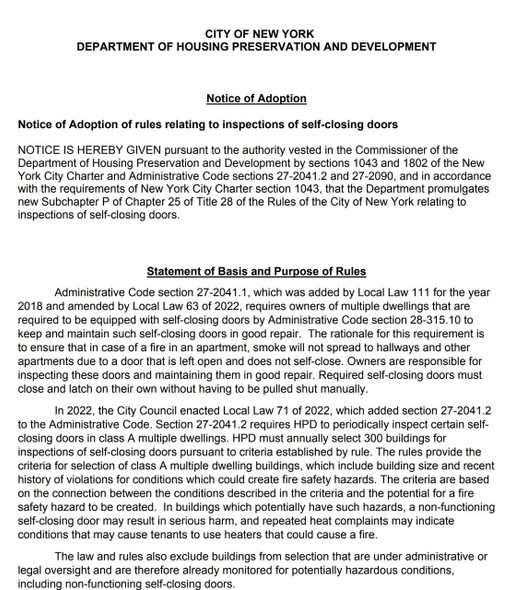hpdsigns.nyc
keep home fire safe hpd flyer (pdf file)
- SKU:
- UPC:
- MPN:
- Five ways to keep your building fire safe hpd flye
Description
Fire Safety Tips from HPD NYC: Essential Advice for Owners and Tenants
Fire safety is a paramount concern for both building owners and tenants in New York City. The NYC Department of Housing Preservation and Development (HPD) provides crucial advice to ensure homes are fire-safe. Here are essential tips from HPD to help owners and tenants protect their homes and lives from the dangers of fire.
For Building Owners
-
Install and Maintain Smoke Alarms: Ensure smoke alarms are installed in every bedroom, outside each sleeping area, and on every level of the building. Regularly test alarms and replace batteries annually. Replace the entire smoke alarm unit every 10 years.
-
Develop and Communicate an Evacuation Plan: Create a detailed evacuation plan and share it with all tenants. Ensure that all occupants are aware of multiple exits and conduct regular fire drills to practice the plan.
-
Keep Exits and Hallways Clear: Maintain clear pathways in all hallways, stairwells, and exits. Prohibit storage of items in these areas to ensure they are always accessible for a quick evacuation.
-
Install and Maintain Self-Closing Doors: Ensure all fire doors are equipped with self-closing devices. Regularly inspect these doors to confirm they close and latch properly, as they play a crucial role in containing fires and protecting escape routes.
-
Provide Stove Knob Covers: In buildings with three or more apartments, provide stove knob covers for gas-powered stoves if there are children under six in the home or upon tenant request. These covers help prevent accidental ignition and reduce the risk of kitchen fires.
-
Regularly Inspect and Maintain Building Systems: Conduct routine inspections and maintenance of heating, electrical, and cooking systems. Employ qualified professionals to address any issues promptly to prevent potential fire hazards.
For Tenants
-
Test Smoke Alarms: Regularly test smoke alarms in your apartment and notify the landlord immediately if any alarms are not functioning properly. Replace batteries as needed to ensure continuous operation.
-
Practice Your Evacuation Plan: Familiarize yourself with the building’s evacuation plan and practice it regularly. Know the location of all exits and the designated meeting place outside the building.
-
Keep Exits Clear: Do not store personal items like bicycles, strollers, or furniture in hallways, stairwells, or near exits. Clear pathways ensure a safe and swift evacuation in case of fire.
-
Use Stove Knob Covers: If you have young children, request stove knob covers from your landlord if they are not already provided. These covers are essential for preventing accidental ignition of stove burners.
-
Be Cautious with Electrical Appliances: Avoid overloading electrical outlets and extension cords. Unplug appliances when not in use, and replace damaged cords immediately to prevent electrical fires.
-
Report Maintenance Issues Promptly: Notify your landlord of any maintenance issues that could pose fire hazards, such as faulty wiring, malfunctioning heating systems, or broken smoke alarms.
The Importance of Fire Safety
Fire safety is a shared responsibility between building owners and tenants. By adhering to HPD's guidelines, both parties can significantly reduce the risk of fire, protecting lives and property. Building owners must ensure that their properties comply with fire safety regulations and provide the necessary safety features and maintenance. Tenants, on the other hand, must remain vigilant and proactive in maintaining their living spaces and reporting any safety concerns.
Creating a fire-safe environment requires continuous effort and cooperation. By following these essential tips from HPD, building owners and tenants can foster a culture of safety and preparedness, ultimately making New York City a safer place to live
DISCLAIMER these codes may not be the most recent version. The State / federal or other regulation department may have more current or accurate information. We make no warranties or guarantees about the accuracy, completeness, or adequacy of the information contained on this site or the information linked to on the state site. Please check official sources. The requirements for detector are determined by intended use and by applicable regulation. The BUYER is responsible for determining the appropriate detector needed. WE make no warranty or representation of suitability of a detector to any code or for any specific application. IT IS THE CUSTOMER'S RESPONSIBILITY TO ENSURE THAT THE DETECTORS THE CUSTOMER ORDERS ARE IN COMPLIANCE WITH ALL STATE, FEDERAL, LOCAL, AND MUNICIPAL LAWS. Please review terms and conditions prior to purchase. For more information about what is required, see the laws that are referenced and the rules applicable to your city and state. This page is for informational purposes only and is not intended as legal advice, professional advice or a statement of law. You may wish to consult with an attorney.
Related Products


keeping homes fire safe NYC (Free PDF file)
hpdsigns.nyc


hpd Self-Closing Doors flyer (pdf file)
hpdsigns.nyc


Residential Apartment Fire Safety Flyer (pdf file)
hpdsigns.nyc



